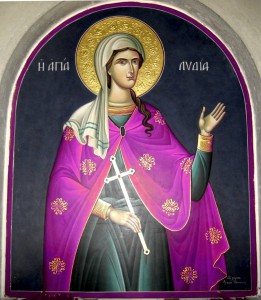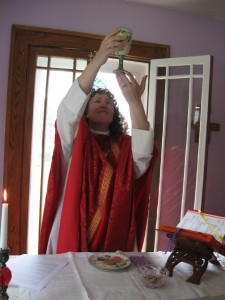Early leaders in the Christian faith: Dorcas, Lydia, & Phoebe
 A friend on Facebook reminded me that today was the commemoration of Dorcas, Lydia, and Phoebe. Who you may ask? Let me tell you all about them:
A friend on Facebook reminded me that today was the commemoration of Dorcas, Lydia, and Phoebe. Who you may ask? Let me tell you all about them:
Dorcas
Now in Joppa there was a disciple whose name was Tabitha, which in Greek is Dorcas. She was devoted to good works and acts of charity. At that time she became ill and died. When they had washed her, they laid her in a room upstairs. Since Lydda was near Joppa, the disciples, who heard that Peter was there, sent two men to him with the request, ‘Please come to us without delay.’ So Peter got up and went with them; and when he arrived, they took him to the room upstairs. All the widows stood beside him, weeping and showing tunics and other clothing that Dorcas had made while she was with them. Peter put all of them outside, and then he knelt down and prayed. He turned to the body and said, ‘Tabitha, get up.’ Then she opened her eyes, and seeing Peter, she sat up. He gave her his hand and helped her up. Then calling the saints and widows, he showed her to be alive. This became known throughout Joppa, and many believed in the [Christ] (Acts 9:37-42).
You almost miss Dorcas’ story. After all most of Acts 9 is taken up with Saul’s conversion (later to become the apostle Paul) to Christianity after leading the persecution against the early church. So after God literally threw Saul off his ass (sorry I just cannot resist that one), he went blind, was healed and started preaching, the focus of the story quietly changes to Dorcas. By the time we meet her, she has died. This is a great lost to her community because she took such good care of them. And she took very good care of those who were considered the least of these: widows. Woman without a husband had no social standing at this time. They were normally destitute women who were forced to beg or to become prostitutes to support themselves and their children. If a woman did not have family at this time, she was in a very precarious place. Dorcas made sure these women had clothes. Now when the story tells us that Dorcas made the clothes, it means a little bit more than she cut some material and sewed it. First she would have to spin the fiber into thread then weave it on her loom for the tunics and clothing she made. This was truly a labor of love on her part to make sure those in her community were at least dressed. She may have also weaved pieces for local merchants to sell in order to support herself (there is no mention of a husband). As long as a woman had a loom and access to wool or flax, she could make a living. Apparently not all the widows Dorcas knew had their own looms to make their own clothes or clothing to sell. Dorcas made sure they had the clothing they needed to survive.
Her illness and death was a big loss to the community, so they sent messengers to a nearby town because they heard Peter was there. Peter came, and the widows showed him the clothing Dorcas had made them. Peter responded to their grief. After sending everyone outside, he prayed and then said to her, “Tabitha get up.” She rose from the dead and was restored to her community. News spread. More people believed in God.
Lydia
We set sail from Troas and took a straight course to Samothrace, the following day to Neapolis, and from there to Philippi, which is a leading city of the district of Macedonia and a Roman colony. We remained in this city for some days. On the sabbath day we went outside the gate by the river, where we supposed there was a place of prayer; and we sat down and spoke to the women who had gathered there. A certain woman named Lydia, a worshipper of God, was listening to us; she was from the city of Thyatira and a dealer in purple cloth. [God] opened her heart to listen eagerly to what was said by Paul. When she and her household were baptized, she urged us, saying, ‘If you have judged me to be faithful to [God], come and stay at my home.’ And she prevailed upon us (Acts 16:11-15).
Paul and his traveling companions arrived in Philippi. There was no synagogue for them to worship at, so they decided to go to the river on the Sabbath where there was a place of prayer. Lydia was at the river. She was “a worshiper of God,” and listened to Paul’s teachings. In fact, we are told God “opened her heart to listen eagerly to what was said by Paul.” In the next verse she and her household were baptized, and she urged Paul and his travelers to stay in her house. Lydia was the first convert to Christianity in Europe.
Lydia was a businesswoman, “a dealer of purple cloth” from Thyatira. Purple dye was a symbol of power and honor in the ancient world, and it was the most expensive and sought after dye in the Roman world. Thyatira was the capitol of the industry and renowned for its purple dyes. One had to have plenty of capital to deal in purple dye and the making of purple garments for sale. Lydia was a career woman, rich, the head of her household, and Acts 16:40 implies that by the end of Paul’s stay in Philippi a new church was meeting in Lydia’s home. All of this could mean that Lydia was the overseer or pastor of the first church plant in Europe.
Phoebe
I commend to you our sister Phoebe, a deacon of the church at Cenchreae, so that you may welcome her in the [Christ] as is fitting for the saints, and help her in whatever she may require from you, for she has been a benefactor of many and of myself as well (Romans 16:1-2).
Paul highly commended and respected Phoebe. He called her a “sister,” “deacon,” and “benefactor” to the church at Cenchreae as well as a sister and benefactor to Paul.
The odd thing about diakonos or “deacon” being used to describe Phoebe is that it is the masculine form of the word used to describe a woman. It is the same word Paul uses when he calls Timothy and Titus “servants” or “deacons” (or pastors) of their respective churches. Another thing that makes this phrase odd is that Phoebe is called the “deacon of the church of Cenchreae.” This is the only place in the New Testament where diakonos is followed by a specific congregation. This is the only place linking a specific person’s ministry with a specific church. This seems to indicate that Phoebe served as a deacon in the church at Cenchreae.
Paul uses another word to describe Phoebe: prostatis. This is the only occurrence of the word in the New Testament. This word is normally translated so that it’s main meaning is not obvious. The normal translation is “helper” or someone who has helped. The basic and most obvious translation of the word from classical Greek is “patron” or “benefactor,” and women in this role, are well attested in the Greco-Roman world. In the Greco-Roman world wealthy women sponsored the arts, philosophers, writers, and politicians. They paid them and gave them the social standing they needed to succeed. Phoebe was a wealthy woman who served the church out of her means as the women in Luke 8 served Jesus out of theirs. For Paul to say that Phoebe was a benefactor to him meant that she had probably helped to support his missionary travels financially. It’s also very likely she was known in Rome, and she has the appropriate social status and clout to introduce Paul to the churches in Rome. Churches Paul had not had any dealings with, nor had he helped plant them.
Phoebe was a woman who had her own means, and served the church in a leadership role. Paul comes very close to commanding churches he had no hand in planting, and Christians, most of whom he had never met, to welcome her and provide anything she needed. She was not only a deacon and a benefactor in the church, but Paul himself had also benefited from her generous leadership.
Prayer: “Filled with your Holy Spirit, gracious God, your earliest disciples served you with the gifts each had been given: Lydia in business and stewardship, Dorcas in a life of charity and Phoebe as a deacon who served many. Inspire us today to build up your Church with our gifts in hospitality, charity and bold witness to the Gospel of Christ; who lives and reigns with you in the unity of the Holy Spirit, one God, now and for ever. Amen” (from Satucket.com).





